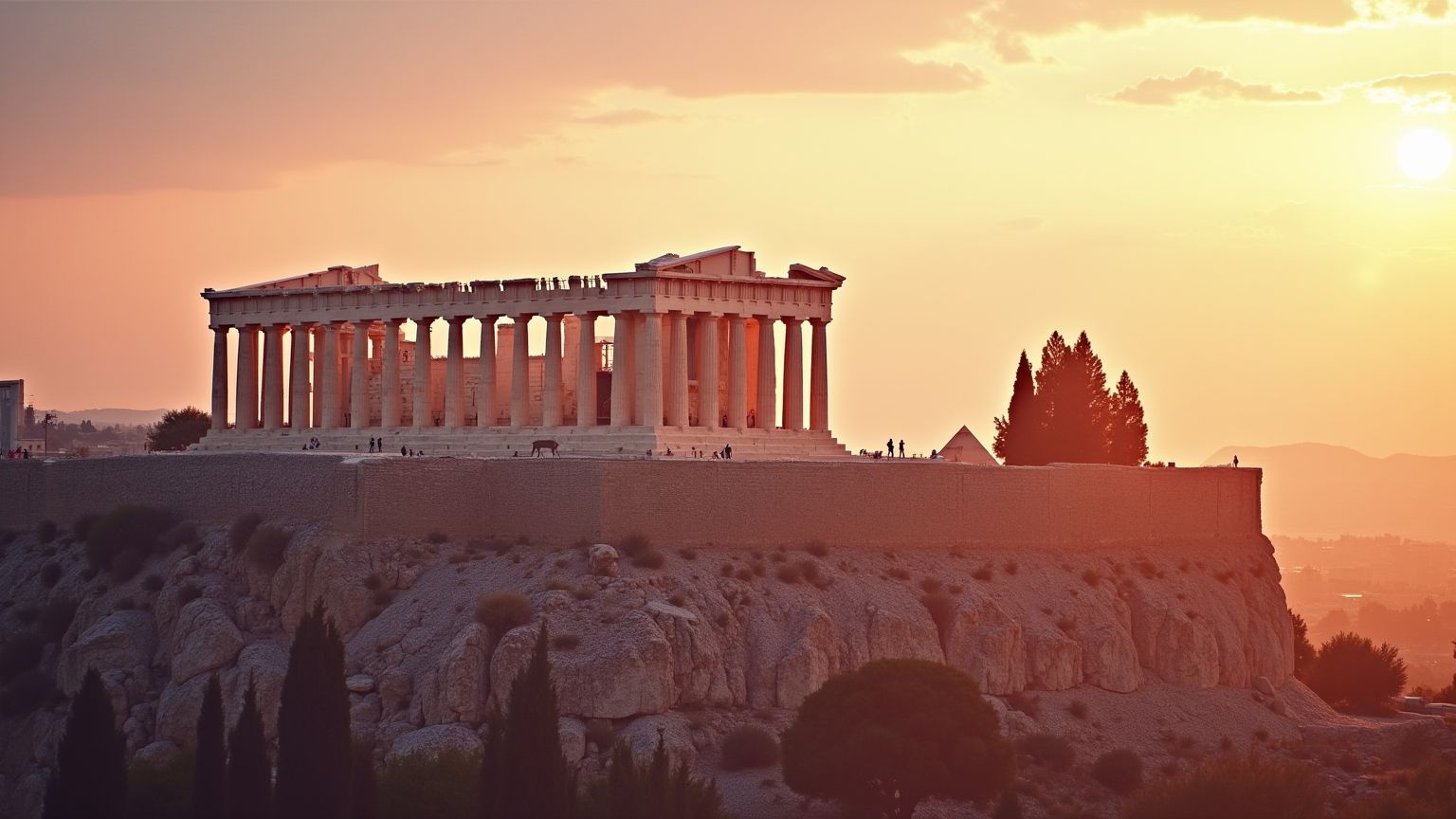When Was Greece Founded? Untangling the Ancient Roots of Hellenic Identity
After spending 15 years guiding wide-eyed travelers through sunbaked ruins and whitewashed villages, I've lost count of how many times I've been asked that deceptively simple question: "When was Greece founded?"
The first time someone asked me when was Greece founded, I was standing in the shadow of the Parthenon with a curious American family. I opened my mouth to recite dates, then closed it again—realizing the answer was far messier than my tour script suggested.
Greece isn't something that appeared with the stroke of a pen or the declaration of a king. Instead, when was Greece founded is a question that leads us down a winding path through millennia of cultural evolution, where ancient philosophies, Byzantine hymns, Ottoman influences, and modern European sensibilities all dance together in one continuous cultural conversation.

Ancient Beginnings: Not a Birthday, But a Slow Awakening
When visitors press me about when was Greece founded, they're usually thinking about those iconic marble columns and philosophical debates. But even pinpointing when "ancient Greece" emerged isn't as clean-cut as history textbooks pretend.
Many scholars mark the Archaic period (800-700 BCE) as when Greece truly became "Greece," but that's like saying a river begins at an arbitrary bend. The Mycenaean civilization (1600-1100 BCE) already displayed distinctly Greek characteristics, including early Greek language forms scratched onto Linear B clay tablets.
"What we call 'Greek civilization' never had an opening ceremony," my archaeologist friend Elena once told me while we shared a bottle of wine overlooking an excavation site. "Communities across these islands and coastlines gradually developed shared ways of seeing the world, worshipping similar gods, and speaking related dialects. When was Greece founded? It crystallized like honey—slowly and naturally."
• Earliest Greek-speaking peoples: Around 2000 BCE
• Mycenaean civilization: 1600-1100 BCE
• Dark Ages: 1100-800 BCE
• Archaic Period (when most consider "Greece" recognizable): 800-480 BCE
Walking through Athens' National Archaeological Museum tells this story perfectly. You can literally watch Greek identity take shape through the artifacts—from primitive Cycladic marble figurines (3200 BCE) to elaborate Mycenaean death masks, leading toward the classical art tourists recognize as "typically Greek."
City-States: The Greek Paradox of Unity Within Division
Here's another wrinkle in answering when was Greece founded: during its celebrated "Golden Age" (5th century BCE), Greece wasn't a unified nation at all! Instead, it was a patchwork of fiercely independent city-states like Athens, Sparta, and Corinth—each with their own governments, armies, and local quirks.
I always tell travelers wandering through Athens' ancient agora: "The people we call 'ancient Greeks' would have been puzzled if you asked when was Greece founded. They identified primarily as Athenians or Spartans—their city loyalty came first."
Yet paradoxically, these often-warring communities recognized a shared Hellenic identity that set them apart from "barbarians" (originally just meaning "those who don't speak Greek"—it sounded like "bar-bar-bar" to Greek ears). They competed in the Olympic Games together, worshipped the same gods, and consulted identical oracles.
"Standing at Delphi," I told a group last summer as they gazed at Apollo's sanctuary, "you're at a place that unified Greeks when nothing else could. City-states that were actively slaughtering each other would still respect the same oracle—revealing the deeper cultural unity beneath their political squabbles."
Byzantine Metamorphosis: When Greek Became Orthodox
One of the most profound chapters in the story of when was Greece founded came with Christianity's rise and the Byzantine Empire—a transformation many tourists overlook while hunting for classical ruins.
Walking through Thessaloniki's Byzantine Museum with visitors, I point out how Greek identity underwent a remarkable evolution: from the polytheistic, philosophy-obsessed classical world to an Orthodox Christian civilization that would define Greek culture for a millennium.
"Every tourist wants to see ancient temples," grumbled Father Nikolaos, my priest friend near Meteora, over homemade tsipouro one evening. "But to understand today's Greeks, you must understand how Orthodox Christianity became inseparable from Hellenic identity. When was Greece founded? For many Greeks, their cultural rebirth happened when Byzantine Orthodox tradition merged with their Hellenic heritage."
This Byzantine influence remains stubbornly visible across Greece today—from the gold-backed icons in tiny village churches to the melancholy Byzantine chants that echo through narrow streets during Easter. The Byzantine period (roughly 330-1453 CE) wasn't a departure from Greek identity but a fascinating reinvention of it.
Ottoman Period: Identity Forged in Resistance
No period shaped modern Greek consciousness more profoundly than the Ottoman era (1453-1821). During these centuries under Ottoman rule, being "Greek" became increasingly defined by what it wasn't—by resistance and preservation of language, faith, and customs.
"The Greek Revolution wasn't just about political freedom," Maria from the National Historical Museum told me during one rainy Athens afternoon. "It represented the explosion of a national identity that had been preserved through whispered stories, village traditions, and religious rituals during Ottoman times. When was Greece founded as a modern nation? Perhaps the seeds were planted during those very years of occupation."
This perspective explains why March 25, 1821—the symbolic start of the Greek Revolution—feels almost sacred in Greek memory. Many travelers are shocked to learn that when was Greece founded as a modern state was technically 1830, making it younger than the United States!
Yet this relatively young nation draws identity from thousands of years of unbroken cultural threads. As I explain to visitors watching the changing of the guard outside Parliament: "Those pleated uniforms and precise movements reference fighters from the 1821 revolution—showing how modern Greece consciously connects itself to moments of rebirth throughout its long past."
Modern Greek Identity: Ancient Echoes in Today's World
What fascinates me most about Greek identity after all my years guiding visitors through this sun-drenched landscape is how ancient concepts continue pulsing through contemporary Greek society.
Consider "filotimo" (φιλότιμο)—a virtually untranslatable Greek virtue encompassing personal honor, dignity, and duty to community. This concept traces directly back to ancient values but remains central to how many Greeks define themselves today. When was Greece founded? In some ways, its core values have never stopped being relevant.
When visitors join local families for dinner through our cultural exchange program, they're often amazed by how today's Greeks reference ancient history as casually as yesterday's football match. A grandmother in a mountain village might say, "We Greeks have been making this cheese since before Aristotle was born," collapsing 2,500 years into one continuous story.
Yannis, an 83-year-old fisherman near Nafplio with hands like weathered leather, once told me something that perfectly captures this sense of continuity: "My father's father's father was Greek, going back forever. The language evolves, religions come and go, but our connection to this particular light on this particular sea hasn't changed. When was Greece founded? We're still the people who built the Parthenon—just catching different fish."
Generational Views: One Heritage, Many Interpretations
What it means to be Greek varies dramatically across generations, reflecting Greece's rapidly changing position in our connected world.
For 84-year-old Eleni, who still bakes bread in an outdoor wood oven in her Epirus mountain village, Greek identity remains firmly tied to Orthodox traditions and local customs. "To be Greek is to remember," she insists, her gnarled fingers folding perfect spanakopita triangles. "We remember our saints, our village stories, our family recipes."
Her 45-year-old son Georgios sees Greekness as balancing traditional heritage with Greece's European identity. "Since joining the EU in 1981, we've had to figure out what it means to be both European and distinctly Greek," he explains over coffee thick enough to stand a spoon in. "When was Greece founded as part of modern Europe? That's another beginning in our long story."
Meanwhile, his 22-year-old daughter Sofia, studying computer science in Athens, represents a generation balancing global digital culture with fierce local pride. "I chat with friends around the world and participate in the same TikTok trends as everyone else," she told a visitor during one of our youth discussions. "But I also feel this special responsibility to understand Greek history. When my American friends can't name their great-grandparents, but I can trace my family back centuries in the same village—that's when I feel most Greek."
A Living Timeline, Not a Birthday Party
So when was Greece founded? As I tell travelers on their final evening in Athens, watching the Acropolis light up against the night sky: Greece doesn't have a birthday so much as an ongoing dialogue spanning thousands of years.
The Greece you experience today is simultaneously ancient and newborn—a modern nation-state drawing on memories and traditions that stretch back to myths and legends. Today's Greeks are neither carbon copies of their ancient ancestors nor disconnected from them, but participants in history's longest-running cultural conversation.
This perspective helps explain why questions about when was Greece founded remain so emotionally charged. Archaeological discoveries, academic debates about Hellenic identity, and diplomatic disputes with neighboring countries about cultural heritage aren't just academic exercises—they're part of an ongoing negotiation about what "being Greek" means.
• Mycenaean civilization: ~1600 BCE
• Classical "Golden Age": ~5th century BCE
• Byzantine transformation: 330-1453 CE
• Ottoman period: 1453-1821
• Greek Revolution begins: 1821
• Modern Greek state recognized: 1830
• Greece joins European Union: 1981
When you visit Greece today, you're not simply seeing ancient ruins or experiencing a typical European country. You're stepping into a living timeline where ancient philosophy, Byzantine spirituality, village traditions, and contemporary European culture all coexist—sometimes harmoniously, sometimes in tension.
As my architect friend Dimitra beautifully said while we watched sunset from the Temple of Poseidon at Sounio: "When was Greece founded? Greece isn't something that happened once. It's something constantly beginning again, with each generation redefining what this ancient identity means in their moment."
Perhaps that's the truest answer to when was Greece founded. It began thousands of years ago with scattered Aegean communities developing shared cultural traits. It began again when city-states recognized their common Hellenic heritage. It began again through Byzantine transformation, again through Ottoman-era resistance, again with independence in 1830. And in many ways, it continues beginning anew as each generation of Greeks redefines their relationship with this extraordinary heritage.
For travelers seeking to understand Greece beyond postcard views, this perspective offers something more valuable than any timeline. It provides insight into a place where ancient philosophy, Byzantine mysticism, village traditions, and contemporary European identity all contribute to what it means to say "I am Greek" today.








